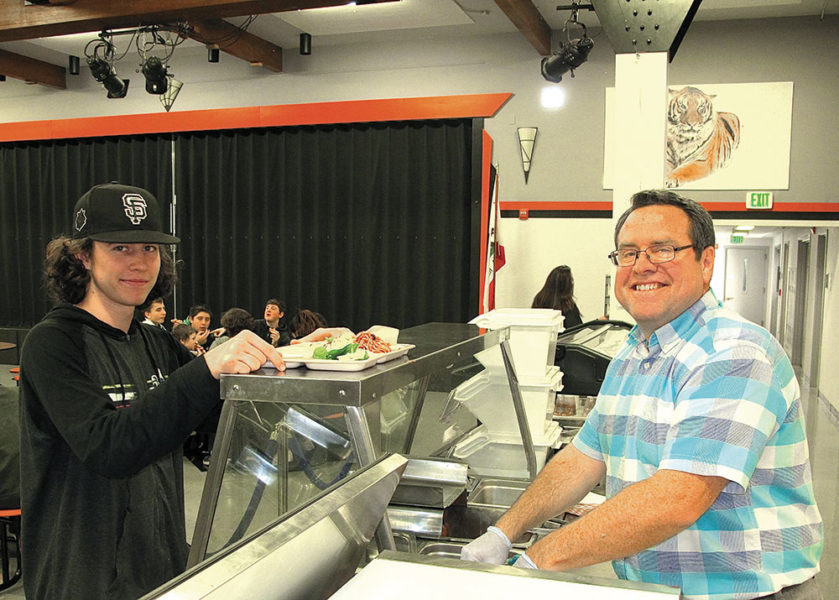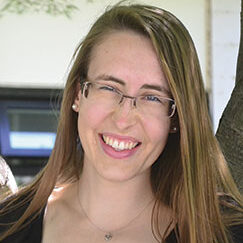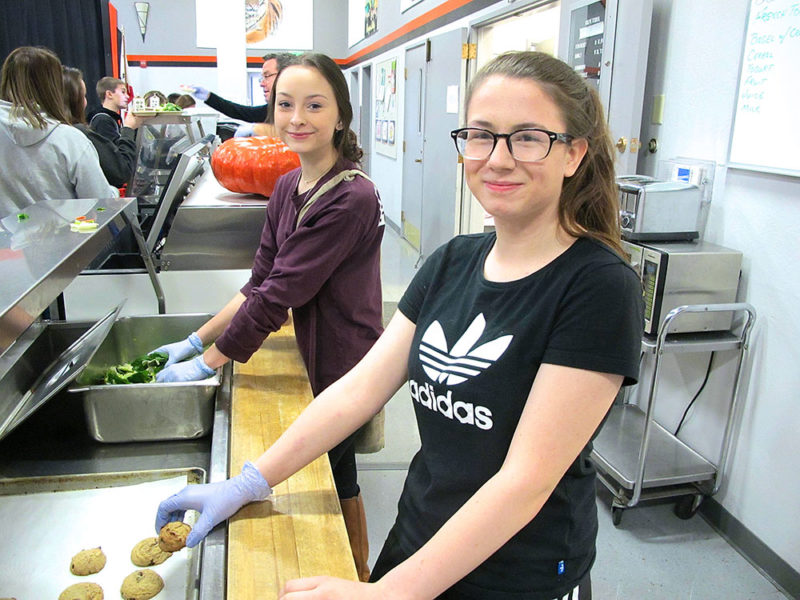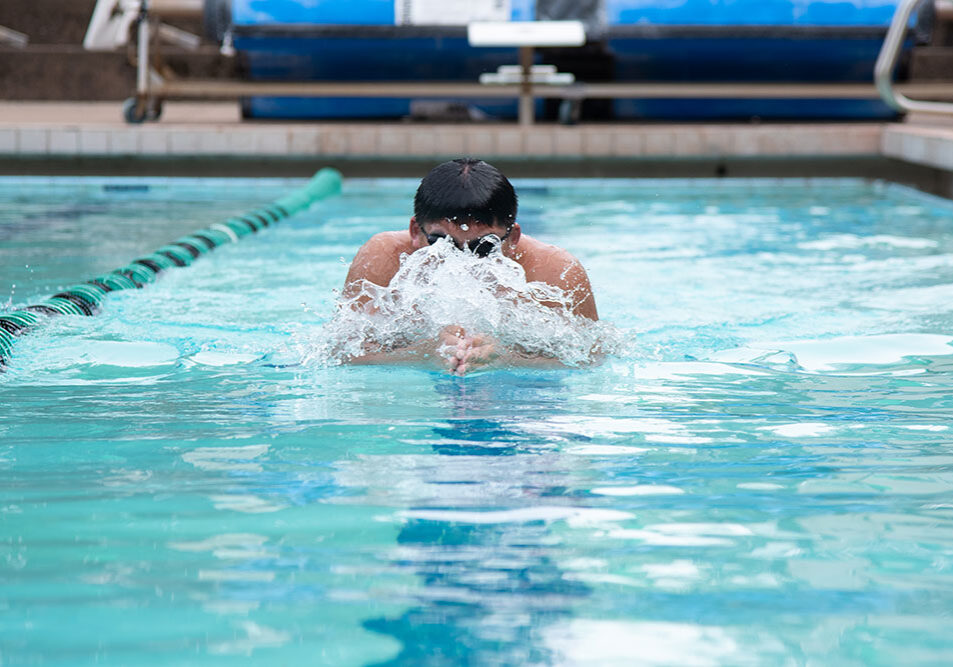“This is not like a class,” Jeff Capps announces to students enrolled in Dunsmuir High School Culinary Arts Program (Dunsmuir, CA). Each new roomful of students may well wonder what they’ve gotten themselves into, if not a class. But Jeff quickly explains: “This is more like a job. If you arrive on time and do as you’re asked, you’ll do well.”
During each of the six periods of the day, Jeff imparts ninth- through twelfth-graders with practical knowledge and skills he gathered during his 30 years of food service. With so many hands on deck, the school does not employ cafeteria workers, but rather relies on the culinary arts program for all school meals. The first-period class prepares healthy, brain-boosting snacks for the morning nutrition break. Second and third periods prepare lunch, then fourth period cleans up from lunch and begins prep work for the following day’s lunch. The last two periods of the day – reserved for upperclassmen who have already taken the other classes in the program – are for learning about catering and hotel management.
With fewer than 80 students enrolled in the school, Dunsmuir High School (DHS) already has a personal, familiar atmosphere. The culinary arts students prepare lunch for more than 50 of their peers each day, a responsibility that only strengthens the school’s close-knit environment. “The program gives my students hands-on experience every day,” says Jeff, “It gives them ownership of the food. If there are kudos for the meal, the kids get those; if there are not kudos, the kids get that too.” Teens learn important nutrition lessons, reinforced by what Jeff selects for the menu, and learn to prepare dishes for dietary restrictions. “We do a lot of fresh food every day, so that makes it easy to make vegetarian and gluten-free options,” Jeff says. Students stock the salad bar with 14-18 items a day, and check the supply of fresh fruit available to those who need a little extra bite to eat between classes.

Dunsmuir High School instructor Jeff Capps helps serve healthy and delicious culinary creations in the school’s cafeteria, all prepared by students enrolled in the school’s Culinary Arts program.
Jeff’s students rotate tasks to experience all aspects of the kitchen, from chopping and stirring to dish duty or wiping down tables. When preparing food, students use the cafeteria’s commercial kitchen, a space furnished with updated equipment used in modern restaurants. Beyond becoming familiar with the tools of the trade, students also learn methods of handling food according to state food safety guidelines. As a ServSafe instructor and proctor, Jeff provides training that enables students to obtain the food handling certification required by all California restaurants. Gaining this certification makes DHS teens especially employable even before graduation, since potential employers do not have to finance the certification expense. Jeff sees the course as vocational education that can benefit students regardless of whether or not they go to college. Jeff himself, having worked full-time as a pizza parlor manager during high school, did not attend a university but continued in the workforce upon graduation. After culinary school, Jeff opened his own restaurant when he was 22. “I knew what I wanted to do, and I just did it,” Jeff says.
Along with its merits as a vocational education program, DHS Culinary Arts gives form to concepts that, on the surface, might seem purely academic. Some students have trouble with reading, but find that working over a recipe brings the value of reading to a whole new level. Others struggle with math, but, as Jeff says, “when I put a recipe in front of them, which is all math, they can knock it out. It’s a different perspective; they’re not doing math, they’re making cookies. They’re thinking end result. I tell them, ‘You have no idea how much math and science you’re using when you’re cooking!’”
Always the entrepreneur, Jeff constantly finds room to improve the program, even amid its established popularity. Thanks to funding from a grant, Jeff recently installed a hydroponic herb garden in his classroom. Hydroponics, a set of techniques for growing plants without soil, allows people to grow food in places inaccessible to traditional agriculture, such as arid or very cold climates. By growing rosemary, thyme, basil, chocolate mint and other herbs, DHS students can learn about this innovative technology. In addition, Jeff has plans for an outdoor garden and a greenhouse, which will give students exposure to growing food and cooking with fresh produce. Jeff also hopes to offer adult cooking classes to parents after school in the near future.
“There are many schools with culinary arts programs,” Jeff says, “but not many are incorporated into the cafeteria, or involve preparing food for people every day. I would love for other schools to know about this program and have the chance to adopt it.” DHS has certainly developed a wonderful way to save school dollars while richly investing in teens – today and in their futures.
Comment Policy: All viewpoints are welcome, but comments should remain relevant. Personal attacks, profanity, and aggressive behavior are not allowed. No spam, advertising, or promoting of products/services. Please, only use your real name and limit the amount of links submitted in your comment.
Comments
Leave a Reply
You Might Also Like...

Fabulous Feast-ivities
For foodies looking for an excuse to go nuts this holiday season, there are plenty of lesser-known holidays inviting you to celebrate. Bakers, candymakers and home chefs can rejoice, regardless […]

How Playing With LEGO Enhances Learning
Your children probably have LEGO bricks and building components or a similar building toy system. And you may have stepped on stray plastic components and wondered if it was really […]
Saving Water With Every Flush
Most people only think about toilets on an as-needed basis, or on those unfortunate and annoying occasions when the toilet stops working. But did you know that flushing toilets is […]
Heating Bills Leaving You Cold? The Benefits of Mini-Split, Heat Pumps.
Most people have heard of heat pump technology. More and more these days, heat pumps are providing both heating and cooling for homes and businesses. Traditionally in the U.S., heat […]






Carolyn Anderson says
Great article on a great guy! He’s a go-getter! This is a vey beneficial class for DHS students. All schools need a program like this!